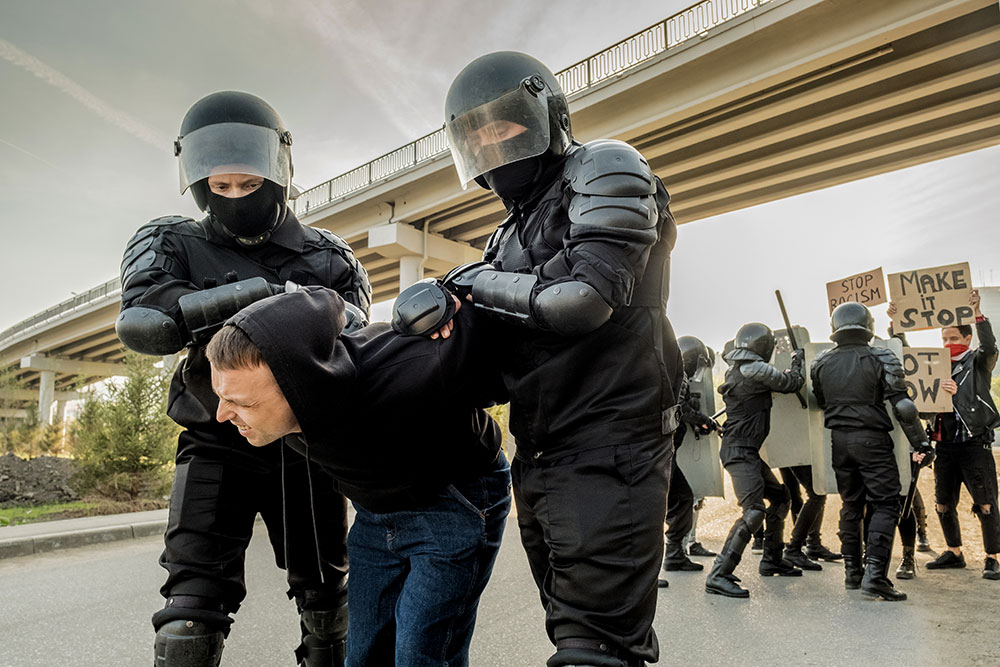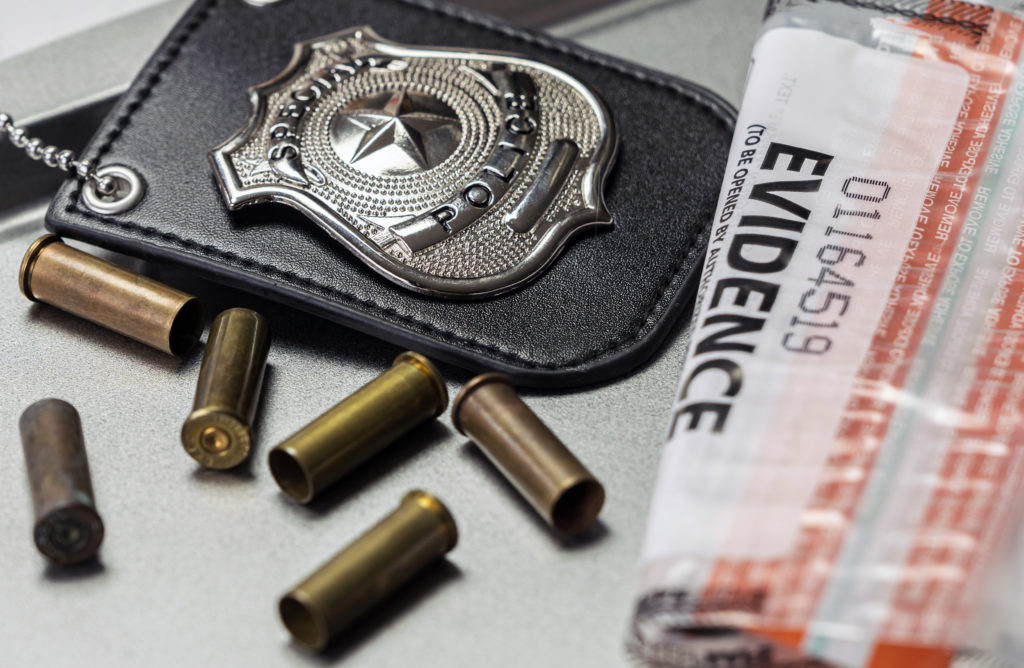Jan 30, 2024 | Police Misconduct
 When we think about police misconduct, most of us think of violence and unnecessary shootings because of what’s been portrayed in the media for the past few years. The use of camera phones to record police behavior has shone a light on how many officers abuse their power and violate citizens’ civil rights. But when you consider that the police department’s main task is to protect the citizens and uphold the laws of the state, many other types of police misconduct are overlooked.
When we think about police misconduct, most of us think of violence and unnecessary shootings because of what’s been portrayed in the media for the past few years. The use of camera phones to record police behavior has shone a light on how many officers abuse their power and violate citizens’ civil rights. But when you consider that the police department’s main task is to protect the citizens and uphold the laws of the state, many other types of police misconduct are overlooked.
Eventually, most everyone ends up in a situation dealing with the police and the majority of these will be harmless. And while most officers do behave appropriately, some of them do not. It is important to know your rights and what to do when they are violated.
What is police misconduct?
Identifying police misconduct can sometimes be difficult, especially in high-pressure situations when tensions and emotions are high. It can take many forms, from excessive use of force to unlawful arrests to abuse in jail and prison. It refers to inappropriate or unreasonable action taken by police officers while in the performance of their duties that violates a person’s constitutional rights. While the violation of police policies should be reported so that supervisors can ensure police officers stay within the boundary lines of the police agencies involved, the violation of your constitutional rights by a law enforcement officer is significantly more serious and often requires litigation to set the record straight and seek a remedy for the harms and injustice caused. Understanding what constitutes police misconduct can help you recognize when your rights have been violated and when you need to seek action.
Different forms of police misconduct
Unlawful stop or detention in violation of the Fourth Amendment
You have the right to be free from unreasonable searches and seizures and that includes the right to be free from arbitrary police stops. The police must have a valid reason, such as a valid and articulable suspicion that a crime or traffic violation is or is soon to be committed before they can legally stop you or detain you. There are also limits to the scope of a valid detention once initiated. Police are only allowed to detain you long enough to address the reason they stopped you in the first place. And if it’s determined you did nothing illegal, you should be allowed to go on about your business. Police cannot keep you detained to try to find a new and previously unknown reason to arrest you. And if the police are questioning you, you can always ask if you are being detained or arrested. If the answer is no, you should ask if you are free to leave, and if they say yes, you should leave immediately. You need not answer questions to leave.
Racial profiling or discrimination in violation of the Fourth or Fourteenth Amendment
Despite advancements in racial equality over the years, racism sadly still exists, and some police officers have racial biases that affect their decisions. When an officer stops, detains, searches, or arrests you based on your race, instead of having a reasonable and articulable basis to believe that you committed a crime, that is police misconduct and they are violating your civil rights. People of color experience this the most, often being pulled over or stopped on the street for no reason other than their race. It’s also a violation of your civil rights for the police to stop you because of your gender, sexual orientation, or other protected class characteristics. Officers will often provide a pretextual reason — a false reason to hide their true intentions — for an unlawful stop, detention, or search that was motivated by race. But pretextual justifications are invalid and must be challenged.
The Fourth Amendment provides citizens with the freedom from unreasonable intrusions by the government, and this includes police misconduct. This can happen when an officer searches you, your vehicle, or your home without probable cause. These types of intrusions always require that police have information amounting to probable cause to believe you committed a crime. Officers typically must have a warrant to search your vehicle or home, but there are more exceptions to this rule for vehicles than for homes. However, they don’t need a warrant when they legally arrest you, when an illegal item is in plain sight, when they make a legal traffic stop and have a valid reason to search (i.e. you appear to be intoxicated and they smell pot smoke), or when you give you consent. So, remember that if an officer asks to search you or your property, you have the right to say no. You can tell them your lawyer told you never to agree to a voluntary search.
Unlawful, false, or wrongful arrest in violation of the Fourth Amendment
An unlawful arrest is when the police physically seize and restrain you in a manner that leaves you without the reasonable belief that you can leave, without possessing sufficient legal justification. Officers need probable cause and/or a warrant based on probable cause to arrest you and take you into custody lawfully. If they act without it, they act in violation of the law and your civil rights.
Depriving you of your Fourteenth Amendment Rights without Due Process of Law
Citizens are guaranteed equal protection under the law and the government cannot deprive you of life, liberty, or property without following fair procedures, such as the right to speak, the right to certain hearings, the right to confront your accusers, the right to an attorney, and other rights that generally fall under this umbrella. These rights often must be raised in a criminal case if you are accused but can sometimes be raised in other venues and other circumstances.
The First Amendment guarantees all citizens freedom of religion, speech, the press, to assemble or petition, and to record police officers in the performance of their public duties. If a police officer attempts to suppress your verbal expression or retaliates against you because of something you have said — so long as you weren’t threatening them or prohibiting them from doing their job — they may be violating your civil rights. Obviously, freedom of speech isn’t absolute, but simply disagreeing with an officer, calling them names, or even flipping them off is not illegal and doesn’t give them the right to stop, detain you, arrest you, or charge you with a crime. Police officers will often assert a pretextual basis for arresting or charging people in violation of their First Amendment rights, but that does not always mean officers have a proper or justifiable reason.
Malicious prosecution in violation of the Fourth and Fourteenth Amendments
A lawful prosecution requires evidence amounting to probable cause at the time charges are brought against a person. If an officer charges you with a crime as a means of harassment, to ruin your reputation, or in an attempt to justify their misconduct, they are acting in violation of your civil rights through wrongful or malicious prosecution. Similarly, police may also act in violation of your rights when they fabricate false material information in a probable cause affidavit used to justify an arrest or to seek an arrest warrant. Police officers must be truthful in these key criminal justice documents or face the consequences of police misconduct.
Officers must be reasonable in the force they apply so that it is used only when reasonably necessary to effectuate a lawful purpose. Force is typically acceptable when officers use it to arrest a wanted person. The force police are authorized to use to arrest can be legally increased if a wanted person flees or resists a lawfully imitated arrest, or if a wanted person threatens or obstructs an officer who is attempting to arrest them. But otherwise, officers are restricted in the amount or type of force that may be applied in any given circumstance. This includes everything from excessive shootings and physical beatings to the inappropriate or overuse of tasers, batons, chemical sprays, or K-9 units. Officer must always be justified in their choice of and use of force within the totality of the circumstances they are facing. Police officers are not legally allowed to use force to get their way or to abuse their police power.
When someone dies because of excessive force or other wrongdoing by the police, detention staff, or detention officers, that is one of the worst civil rights violations that can affect a person. Whether it was on purpose or by recklessness, the officer(s) should be held accountable. Wrongful conduct can involve anything from an illegal shooting to denying someone in detention access to medical care or abusing someone in jails or prisons. If you or a loved one are seriously injured or killed because of the knowing use of significant police force or the reckless failure to protect or provide medical attention, there could be a claim against the officer for that injury.
What laws protect me from police misconduct?
The Fourth Amendment protects you from unlawful searches and seizures, while the Eighth Amendment safeguards you from cruel and unusual punishment. The Fourteenth Amendment and other Federal laws also prohibit discrimination based on race, color, national origin, sex, and religion. Furthermore, persons with disabilities are protected from discriminatory treatment under the Americans with Disabilities Act (ADA) and Section 504 of the Rehabilitation Act.
Finally, Section 1983 of the Civil Rights Act gives you the right to file a lawsuit against a police officer if they violate your civil rights. This law was originally passed to protect citizens from government officials as well as groups like the KKK. This law makes it illegal for anyone acting under the authority of the government to deprive someone of their civil rights.
Why you need a civil rights attorney
A lawyer can play a vital role in uncovering police misconduct and pursuing justice in a police misconduct lawsuit. These types of cases are often difficult, time-consuming, and complex and very often require a specialist who is 100% committed to your rights. The Civil Rights Litigation Group has handled many successful lawsuits against the police and other jail/prison officials, and we understand the complexities of the law in Colorado. If you believe your civil rights have been violated by the police or other government officials, give us a call for a free consultation.
Dec 5, 2023 | Police Misconduct

The newest legislation in Colorado regarding
police misconduct and civil rights is the
Law Enforcement Integrity Act. This act was signed into law in 2022 and went into effect on July 1, 2023. It aims to increase police accountability and transparency by requiring law enforcement agencies to adopt policies and procedures to prevent and address police misconduct while building trust between law enforcement agencies and the communities they serve.
Changes included in the legislation
The use of body cameras: This measure aims to provide an objective record of encounters between officers and civilians, which can be used as evidence in investigations or legal proceedings. This law requires all law enforcement officers to wear body cameras, mandates the release of body camera footage within 21 days of a complaint of misconduct, prohibits the use of chokeholds except in situations where deadly force is justified, and establishes a statewide database to track incidents of use of force by law enforcement officers.
History has shown that officers will often lie — both for themselves and each other — regarding encounters with the public. They have lied about what people said, whether they had a weapon, and whether any physical interaction even took place. But video doesn’t lie. The Elijah McClain case in 2020 is a perfect example of this. The body cam footage captured the encounter between police officers and Elijah McClain, a young black man who died after being put in a chokehold. The footage helped shed light on the excessive force used by the officers, leading to public outrage and calls for change that resulted in this legislation. The situation with George Floyd is another good example. The officers completely left out the use of force when writing their reports, but both their body cam footage as well as phone videos taken by witnesses showed differently. And that resulted in the officers not only being fired but also prosecuted for their illegal and deadly actions.
Bias training and de-escalation techniques: Bias refers to discrimination and training officers to treat everyone equally, regardless of color, gender, age, or other discrimination classes. Data clearly shows that people of color are often treated much worse and often experience a higher rate of police violence. De-escalation refers to the range of verbal and nonverbal skills that officers can use to de-escalate a situation, make proper threat assessments, and hopefully reduce the likelihood that a situation will escalate into a physical confrontation. By providing officers with the necessary tools to identify and address implicit biases, and diffuse potentially volatile situations, the act aims to reduce the likelihood of excessive use of force incidents.
More rights for police misconduct victims
The act gives survivors of police misconduct enhanced civil remedies and allows for the decertification of officers who engage in serious misconduct. This means that officers found guilty of significant violations of departmental policies or laws may lose their certification and be prevented from working in law enforcement in the future. Preventing bad cops from remaining on the force is a big step towards reducing police misconduct.
The act also allows victims to seek compensation and justice for any harm or rights violations they may have suffered. Furthermore, the Enhance Law Enforcement Integrity Act makes officers personally liable in some lawsuits. This provision reinforces that law enforcement officers are not above the law and should be held accountable for their actions.
What to do if you’re the victim of police misconduct
While these reforms aim to increase accountability and prevent future instances of police misconduct, they can’t fix everything. If you believe you are the victim of police misconduct, you have rights but there are time limits to file your complaint. Having a civil rights attorney can help you navigate the process and get better results. Please call us for a free consultation.
Call 720-515-6165 for a free consultation.
May 25, 2023 | Civil Rights Law, Criminal Defense
 If you live in Colorado, getting your records sealed is much easier than it used to be. Landmark legislation (House Bill 19-1275) made it possible to seal many convictions and other types of criminal justice records that were never eligible for sealing in the past. You can even move to seal multiple convictions in some cases, and the rules allow for the sealing of many types of felonies, not just lower-level offenses. The new law even allows you to get records sealed for some types of sex offenses.
If you live in Colorado, getting your records sealed is much easier than it used to be. Landmark legislation (House Bill 19-1275) made it possible to seal many convictions and other types of criminal justice records that were never eligible for sealing in the past. You can even move to seal multiple convictions in some cases, and the rules allow for the sealing of many types of felonies, not just lower-level offenses. The new law even allows you to get records sealed for some types of sex offenses.
Who is eligible to have their records sealed?
If you have a case that resulted in a complete dismissal, acquittal, or you successfully completed a deferred judgment, then you may be eligible to have your records sealed automatically. This simplified process requires the court to seal your records and is very streamlined. In most of these cases, the prosecution cannot even object. It is your right to have your records sealed.
When can I have conviction records sealed?
The law also allows for the sealing of convictions for many types of offenses. For eligible types of convictions, if you have not been charged with any new crimes after the case you are trying to seal, you can move to have your records sealed after the passage of short waiting periods. Those waiting periods end after your conviction is final or your sentence is complete, whichever happens last. The waiting periods are:
- Petty offenses: 1 year
- Class 2 or 3 misdemeanors: 2 years
- Class 1 misdemeanors: 3 years
- Level 3 or 4 drug felony: 3 years
- Class 4, 5, or 6 felony: 3 years
- All others: 5 years
In addition to having a clean record after the conviction you want sealed, you also must ensure you’ve paid all your fines, costs, and restitution to be eligible. In general, to have conviction records sealed, “the court must determine that the harm to the privacy of the defendant or the dangers of unwarranted, adverse consequences to the defendant outweigh the public interest in retaining public access to the conviction records. In making this determination, the court shall, at a minimum, consider the severity of the offense that is the basis of the conviction records sought to be sealed, the criminal history of the defendant, the number of convictions and dates of the convictions for which the defendant is seeking to have the records sealed, and the need for the government agency to retain the records.” C.R.S. §24-72-706(1)(g). 
What are the exceptions?
There are certain convictions that you cannot seal, but careful analysis of each case is necessary to determine eligibility. There is, however, an exception for certain misdemeanors that are normally prohibited from sealing “if the district attorney consents to the sealing or if the court finds, by clear and convincing evidence, that the petitioner’s need for sealing of the record is significant and substantial, the passage of time is such that the petitioner is no longer a threat to public safety, and the public disclosure of the record is no longer necessary to protect or inform the public.” C.R.S. §24-72-706(2)(b).
How can we help get your records sealed?
We help people seal their records in all types of cases, which can make a huge difference the next time a standard background check needs to be conducted, whether for work, housing, financing, or any other purpose. You can also move to seal certain municipal convictions as well. Call us today for a free consultation to determine your eligibility to get your records sealed, and to help us formulate the best strategy for putting your past where it belongs—behind you.
Call 720-515-6165 for a free consultation.
Jan 18, 2023 | Discrimination, Employee Rights
 In 2022, Colorado passed HB 22-1367 that made several updates to the Colorado Anti-Discrimination Act (CADA). Gov. Jared Polis signed the bill into law on June 8, 2022, with the changes to Colorado employment anti-discrimination laws taking effect on August 10, 2022. CADA makes it illegal for employers to discriminate against an employee on the basis of disability, race, creed, color, sex, sexual orientation, religion, age, national origin or ancestry. It also guarantees equal access to public accommodations and housing.
In 2022, Colorado passed HB 22-1367 that made several updates to the Colorado Anti-Discrimination Act (CADA). Gov. Jared Polis signed the bill into law on June 8, 2022, with the changes to Colorado employment anti-discrimination laws taking effect on August 10, 2022. CADA makes it illegal for employers to discriminate against an employee on the basis of disability, race, creed, color, sex, sexual orientation, religion, age, national origin or ancestry. It also guarantees equal access to public accommodations and housing.
Changes to anti-discrimination laws
In 2022, the Colorado legislature updated CADA to include the following changes:
-
Expands the definition of employee to include individuals in domestic service
HB 22-1367 expands the definition of employee to include domestic service workers, for the purposes of CADA. However, it also includes a provision that allows employers to consider the gender of an applicant when hiring childcare services.
-
Extends the time limit to file a charge with the Colorado Civil Rights Division (CCRD)
Instead of 180 days, you now have 300 days from the time of the alleged discrimination issue to files a charge. This changes brings Colorado’s discrimination laws more in line with federal laws that allow people 300 days to file a complaint with the Equal Opportunity Commission.
-
More consistent remedies for age discrimination cases
The new amendment repeals the prohibition in age discrimination cases against the relief and recovery of certain damages so that the remedies available in employment discrimination claims are consistent, regardless of the type of discrimination alleged. It also extends the time for the Colorado Civil Rights Division (CCRD) to investigate to 450 instead of 270 days.
What is the process for filing anti-discrimination complaints?
With all of these new laws, it is important to remember that there is a statute of limitations (time limit) from the date of the last alleged discriminatory and/or retaliatory act for when you must file a complaint:
-
Employment filing deadline: 300 days from the act of alleged discrimination (possibly up to 300 days for federal matters)
-
Housing filing deadline: one (1) year from the act of alleged discrimination
-
Public Accommodations filing deadline: sixty (60) days from the act of alleged discrimination
Therefore, if you feel that you have been discriminated against, it is important to act fast. If you choose to file a complaint yourself, you can read the steps for the Complaint Process online with the Colorado Civil Rights Division, under the Colorado Department of Regulatory Agencies, or DORA. There are different filings that need to happen before these deadlines, so it is important to start as early as possible. And whether you file yourself or get legal representation, know that the Division has 270 days to complete their administrative process (with 90-day extension requests available to both parties) so it can take a while to resolve.
Who can help me with anti-discrimination lawsuits?
The other option is to consult an attorney who is experienced with not only the deadlines and filing procedures, but also all of the state and federal anti-discrimination laws that may apply to your case. If you believe you are the victim of discrimination, it’s important to act quickly and to gather as much evidence as you can, and then contact a local civil rights attorney who can advise you on your case. The Civil Rights Litigation Group has successfully handled many anti-discrimination cases over the past 10 years and we are 100% dedicated to civil rights issues. We offer free consultations so you can find out if you have a legitimate case. Please call us at 720-515-6165.
Call 720-515-6165 for a free consultation.
Nov 21, 2022 | Civil Rights Law, Police Misconduct

When people are brought in for questioning by the police, they are expected to tell the truth or get in trouble. But what about the officers questioning you — are they bound to be truthful? In Colorado and most states, the short answer is no. They can’t lie in every instance, and they can’t fabricate evidence (Florida v. Cayward, 1989), but most of the time it’s completely legal for them to lie so it’s important to remember this if you are ever interrogated. The Supreme Court ruled in Frazier v. Cupo (1969) that police officers can lie during an investigation as long as it does not “shock the conscience of the court or the community.” For instance, they can’t tell someone that they will lose custody of their children if they don’t confess (Lynumn v. Illinois, 372 US 528 (1963). But they most certainly can lie about a lot of things that can intimidate people into confessing to crimes they didn’t commit. And as long as the court determines that a confession was voluntary and not obtained through violence, the court could allow it.
So, what do the police lie about?

When interrogating someone, the police can use every psychological trick they have to elicit a confession. They can lie about evidence they have, such as telling you that they found your fingerprints at the scene or that you were caught on camera. They might tell you that other people involved have already confessed and have implicated you as well. They might say they have already spoken to your spouse or friend who believe you are guilty. If you take a polygraph test, they can lie and tell you that you didn’t pass. The important thing to remember in these cases is that they can lie about evidence, but they can’t fabricate it. So, if they tell you they have your fingerprints on something, ask to see it. If they tell you they have video of you at a crime scene, ask to see it. And if they show you evidence that you know isn’t real, they have definitely crossed a line. Another thing they cannot do is lie to you about your rights or tell you that incriminating statements you might give won’t be used against you. Miranda warnings (from Miranda v. Arizona, 1966) are required before police officers can legally interrogate you while you are in custody. Those warnings make clear that you have the right to remain silent and that anything you say can and will be used against you in a court of law. Thus, the best practice is almost always to exercise that right and remain silent.
There are a lot of ways the police can trick people into confessing to crimes, even ones they didn’t commit. And you may think that no one would ever admit to doing something they didn’t do, but the psychological pressure of an interrogation can certainly cause someone to do so. Because of this, it’s important to always remember that you have the right to be silent and the right to have an attorney present for questioning. Police might also tell you that you will get a lighter sentence if you confess now instead of waiting for an attorney, but cops don’t decide sentencing so always ask for and consult with a lawyer before believing anything police say.
It’s also important to remember than the police don’t have to read you your Miranda rights unless they take you into custody. So, if you are speaking with an officer at the scene of a crime and they suspect you may be involved, they can intentionally tell you that you are not under arrest in order to get you talking while not technically in custody or they could lie to you about any number of things in order to get you to keep talking before they place you in custody. And if you do so willingly, your statements can be used against you in court. So always keep your guard up if you are speaking to police and there is any chance at all they think you did something wrong. Obviously, you should help the police if you call them about a crime, and often it may be in the public’s interest to serve as a witness to a crime if you have valuable information, but always remember that being innocent isn’t a guarantee that you won’t be implicated in something.
Youth are even more vulnerable when the police lie
The worst part about all this is that in most states the police can lie to kids. Some states, including Colorado (https://leg.colorado.gov/bills/sb22-023), are currently trying to pass laws to stop this. The bill didn’t pass in Colorado this year but legislators are going to reintroduce it in the 2023 session. Kids are even more vulnerable to being intimidated by the police because they either fear or trust them — and the police will absolutely use this to their advantage. Juveniles are also much less likely to know their actual rights when being questioned so it’s easy for an officer to scare them into confessing to something they didn’t do. Our brains don’t fully develop until we are in our mid-twenties, so children and even teens don’t have the same decision-making or reasoning skills that are needed during an interrogation. But until the laws do change, officers are still able to lie to them so it’s important to teach kids what their rights are and how to deal with the police. We recommend readying your children as much as readying yourself for potential police interactions. Make sure they understand that if your children are stopped, they may request a parent, guardian, and/or lawyer be present for questioning, and obviously, they have the right to remain silent.
What are your rights during an interrogation?
The Fifth Amendment protects you from being forced to incriminate yourself and the Fourteenth Amendment prohibits coercive questioning by the police. So, if a confession is coerced or involuntary, it isn’t admissible in court. Also, if the police are going to take you into custody, they should inform you of your Miranda rights — but they don’t always do that. For a confession to be considered involuntary or coerced, usually, one or more of the following needs to have happened:
- The police deprived you of food, water or using the bathroom
- You were denied legal counsel
- The police promised you leniency or told you that your statements wouldn’t be used against you
- The police threatened you in some material way (other than threats to carry out the law)
- They physically harmed you or used a gun to intimidate you into confessing.
The court will also consider other factors such your age, the location and/or length of the interrogation, your mental health at the time, level of intelligence, or if your thinking was impaired due to intoxication. The main legal standard for proving an involuntary confession is whether the police used tactics that undermined your ability to exercise free will.
What can you do?
The most important thing you can do is be aware of your rights and choose to remain silent until you have legal counsel present when you are questioned by the police. They can’t use that against you, although many will lie and tell you that things will be better if you just talk to them — but don’t believe it. And if you were accused of a crime you didn’t commit and believe the police fabricated evidence against you, it’s important that you contact an attorney who specializes in civil rights and dealing with the police. Call us for a free consultation.
Call 720-515-6165 for a free consultation.
 When we think about police misconduct, most of us think of violence and unnecessary shootings because of what’s been portrayed in the media for the past few years. The use of camera phones to record police behavior has shone a light on how many officers abuse their power and violate citizens’ civil rights. But when you consider that the police department’s main task is to protect the citizens and uphold the laws of the state, many other types of police misconduct are overlooked.
When we think about police misconduct, most of us think of violence and unnecessary shootings because of what’s been portrayed in the media for the past few years. The use of camera phones to record police behavior has shone a light on how many officers abuse their power and violate citizens’ civil rights. But when you consider that the police department’s main task is to protect the citizens and uphold the laws of the state, many other types of police misconduct are overlooked.

 The newest legislation in Colorado regarding police misconduct and civil rights is the
The newest legislation in Colorado regarding police misconduct and civil rights is the  If you live in Colorado, getting your records sealed is much easier than it used to be. Landmark legislation (
If you live in Colorado, getting your records sealed is much easier than it used to be. Landmark legislation (
 In 2022, Colorado passed HB 22-1367 that made several updates to the
In 2022, Colorado passed HB 22-1367 that made several updates to the 
